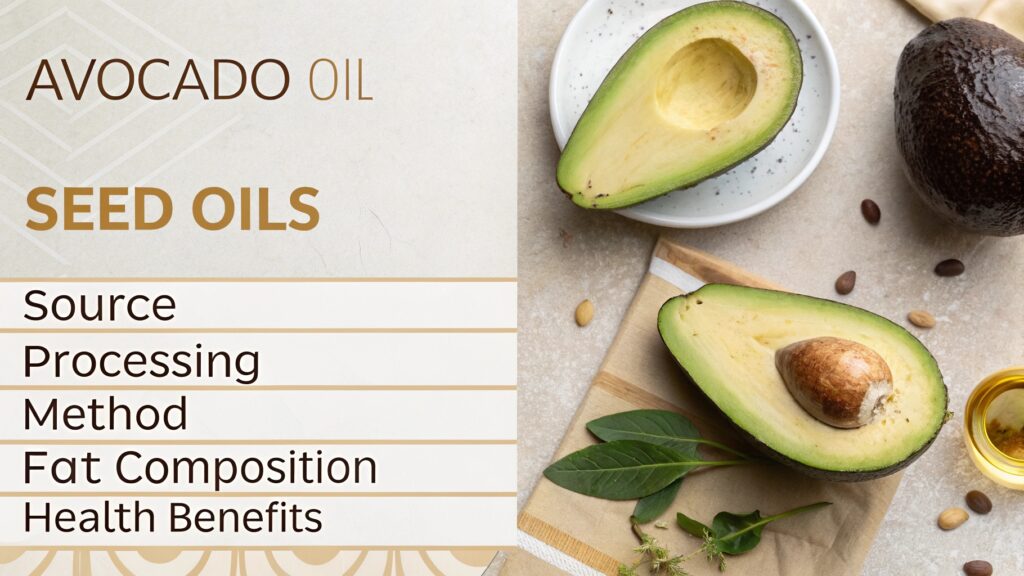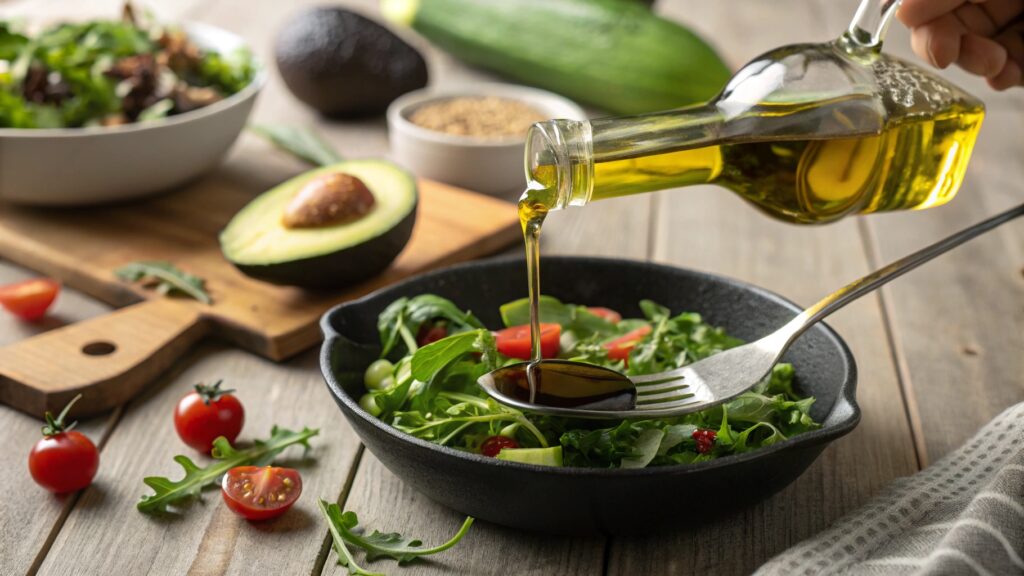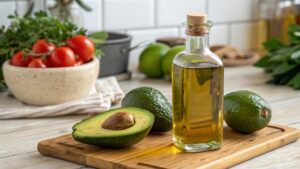Table of Contents
Avocado oil has become a household staple, praised for its rich flavor, high smoke point, and numerous health benefits. But there’s one question that often sparks debate: Is avocado oil a seed oil?
Many people lump avocado oil into the same category as industrial seed oils like soybean, canola, and sunflower oil. However, avocado oil is fundamentally different. While seed oils are extracted from the seeds of plants, avocado oil comes from the flesh of the avocado fruit.
In this article, we’ll break down the differences between avocado oil and seed oils, examine their nutritional profiles, and discuss whether avocado oil is a healthier alternative. We’ll also provide tips on choosing the best quality avocado oil and answer some frequently asked questions.
Introduction to Avocado Oil
What is Avocado Oil?
Avocado oil is a type of fruit oil extracted from the flesh of ripe avocados. Unlike seed oils, which are obtained from crushing or chemically extracting oil from seeds, avocado oil is mechanically pressed from the soft, nutrient-rich pulp of the fruit.
This oil is known for its light, buttery texture and mild, slightly nutty flavor. It is widely used in cooking, skincare, and even as a base for natural cosmetic products.
The Growing Popularity of Avocado Oil in Cooking and Skincare
Over the past decade, avocado oil has become a preferred choice for health-conscious consumers and chefs. Why?
- Cooking benefits: Avocado oil has a high smoke point (around 520°F/271°C), making it ideal for frying, sautéing, and roasting.
- Nutritional value: It is rich in monounsaturated fats, antioxidants, and vitamins like E and K.
- Skincare benefits: Thanks to its anti-inflammatory and moisturizing properties, avocado oil is commonly used in skincare to hydrate and repair dry skin.
Why the Classification of Avocado Oil Matters
Many people confuse avocado oil with seed oils because they are both plant-based. However, this distinction is crucial:
- Seed oils (e.g., soybean, sunflower, canola) are often highly processed, leading to a higher content of inflammatory omega-6 fatty acids.
- Avocado oil, on the other hand, is naturally high in monounsaturated fats, which are linked to better heart health and lower inflammation.
Understanding Seed Oils
Definition of Seed Oils and Their Common Sources
Seed oils are vegetable oils extracted from the seeds of various plants. Some of the most common examples include canola oil, soybean oil, sunflower oil, corn oil, and grapeseed oil. These oils are widely used in processed foods, cooking, and even cosmetics due to their affordability and long shelf life.
Unlike avocado oil, which is pressed from the flesh of the fruit, seed oils come from hard seeds that require extensive processing. This distinction is essential when discussing whether avocado oil is a seed oil.
How Are Seed Oils Extracted?
The extraction process of seed oils typically involves:
- High heat and pressure – Seeds are crushed and heated to release oil.
- Chemical solvents – Hexane, a petroleum-derived solvent, is often used to extract more oil.
- Refining and bleaching – The oil undergoes chemical refining to remove impurities, resulting in a highly processed final product.
This process contrasts sharply with cold-pressed avocado oil, which retains more of its natural nutrients and beneficial fats.
Health Implications of Seed Oils
One of the biggest concerns surrounding seed oils is their high omega-6 fatty acid content. While omega-6 is an essential fat, excessive intake (especially without enough omega-3 balance) can contribute to chronic inflammation, which is linked to diseases like heart disease and obesity.
Additionally, the refining process used for seed oils often leads to:
- Oxidation, making the oil more prone to forming harmful compounds.
- The presence of trans fats, which can raise bad cholesterol (LDL) and lower good cholesterol (HDL).
- Loss of antioxidants and vitamins during refining.
Is Avocado Oil a Seed Oil?
How Avocado Oil is Extracted: Fruit vs. Seed Oils
To answer the question is avocado oil a seed oil, we must look at how it’s made. Unlike seed oils that come from the seeds of plants, avocado oil is extracted from the flesh of the avocado fruit.
- Cold-pressed avocado oil is made by mechanically pressing the fruit, preserving its natural antioxidants, vitamins, and healthy fats.
- Refined avocado oil undergoes some processing but is still far less refined than industrial seed oils.
This fundamental difference in extraction places avocado oil in the same category as olive oil, another healthy fruit oil.
Comparison with Other Popular Seed Oils

If we compare avocado oil to canola, soybean, and sunflower oil, we see key differences:
| Property | Avocado Oil | Seed Oils (Canola, Soybean, etc.) |
|---|---|---|
| Source | Avocado flesh | Seeds (soybean, sunflower, etc.) |
| Extraction | Cold-pressed or refined | Chemical extraction with solvents |
| Fat Profile | High in monounsaturated fats | High in omega-6 fats |
| Processing | Minimal (especially cold-pressed) | Highly processed and refined |
| Health Benefits | Rich in antioxidants, vitamin E | Often linked to inflammation |
Clearly, avocado oil does not fit the seed oil category in terms of extraction, nutrition, or health impact.
Clarifying the Misconception: Why Avocado Oil Is Not a Seed Oil
So why do some people mistakenly call avocado oil a seed oil?
- Misunderstanding plant-based oils – Many assume all vegetable oils are the same, lumping fruit oils (like avocado oil) with seed oils.
- Marketing confusion – Some brands group all plant oils together, even if their sources and processing methods differ.
- Lack of awareness – People unfamiliar with how avocado oil is made may assume it comes from the seed.
Nutritional Profile of Avocado Oil vs. Seed Oils
Key Nutrients in Avocado Oil
Avocado oil is packed with essential nutrients that support overall health. Unlike heavily processed seed oils, it retains most of its natural vitamins and antioxidants. Here’s what makes it stand out:
- High in monounsaturated fats (MUFA) – About 70% of avocado oil’s fat content comes from heart-healthy oleic acid, the same beneficial fat found in olive oil.
- Rich in vitamin E – This powerful antioxidant helps protect cells from damage and supports skin health.
- Contains lutein – A carotenoid that promotes eye health and may help prevent macular degeneration.
- Low in omega-6 fatty acids – Unlike seed oils, avocado oil has a healthier omega-6 to omega-3 ratio, reducing inflammation risks.
Differences Between Avocado Oil and Common Seed Oils
Many people assume that all vegetable oils are equally healthy. But when you compare avocado oil with industrial seed oils, the differences are clear:
| Nutrient | Avocado Oil | Seed Oils (Canola, Soybean, etc.) |
|---|---|---|
| Monounsaturated Fat (MUFA) | 70% | 20-35% |
| Omega-6 Fatty Acids | Low | High |
| Omega-3 Fatty Acids | Small amount | Almost none |
| Vitamin E Content | High | Low (often lost during processing) |
| Processing | Cold-pressed or minimally refined | Chemically processed |
This breakdown highlights why avocado oil is a healthier alternative to seed oils.
Health Benefits of Avocado Oil Compared to Seed Oils
So, how does avocado oil impact your health compared to seed oils?
✅ Supports heart health – The high monounsaturated fat content in avocado oil helps lower bad cholesterol (LDL) while raising good cholesterol (HDL). On the other hand, many seed oils are pro-inflammatory due to excess omega-6.
✅ Better for digestion – Avocado oil is gentle on the stomach, while some refined seed oils may cause bloating or digestive issues.
✅ Protects against oxidative stress – Its natural antioxidants help fight free radicals, whereas processed seed oils often contain oxidized fats that contribute to aging and inflammation.
Clearly, avocado oil provides better nutrition and fewer risks than common seed oils.
The Role of Avocado Oil in a Healthy Diet
Why Health Experts Recommend Avocado Oil
Many nutritionists and health experts encourage people to replace seed oils with healthier options like avocado oil. But why?
- It’s minimally processed – Unlike seed oils, avocado oil retains its natural antioxidants and healthy fats.
- It’s rich in stable fats – Monounsaturated fats in avocado oil are less prone to oxidation, making them safer for cooking.
- It supports weight management – The healthy fats in avocado oil promote satiety, helping you feel full longer.
If you’re looking for a nutrient-dense oil that supports heart health, digestion, and overall well-being, avocado oil is a top choice.
Cooking with Avocado Oil vs. Seed Oils
One of the biggest advantages of avocado oil over seed oils is its high smoke point. Here’s why that matters:
- Avocado oil smoke point – Around 520°F (271°C), making it perfect for frying, roasting, and grilling.
- Common seed oils smoke points – Canola and soybean oils range between 350-450°F (177-232°C), meaning they break down faster under high heat.
Cooking with oxidized oils can produce harmful compounds that increase inflammation and may contribute to chronic diseases. That’s why avocado oil is the safer choice for high-heat cooking.
Does Avocado Oil Have the Same Health Risks as Seed Oils?
One of the biggest myths is that all plant-based oils are the same. But is avocado oil a seed oil in terms of health risks? Not at all.
- Avocado oil does not contain harmful trans fats, which can be present in processed seed oils.
- It does not undergo harsh refining, unlike chemically extracted vegetable oils that can lose their nutrients.
- Its natural fat profile promotes heart health, while omega-6-rich seed oils can contribute to inflammation when consumed in excess.
For anyone trying to reduce their inflammatory food intake, switching from seed oils to avocado oil is a smart, health-conscious move.
No Relevant Internal Links Found
Since there were no relevant internal links available on SpedyRecipes, consider checking out their recipe section for more healthy cooking ideas!
How to Choose High-Quality Avocado Oil

Cold-Pressed vs. Refined Avocado Oil
When shopping for avocado oil, you’ll come across two main types: cold-pressed and refined. But which one is better?
- Cold-pressed avocado oil is made by mechanically extracting oil from the fruit without heat or chemicals. This method preserves its nutrients, antioxidants, and natural flavor.
- Refined avocado oil goes through processing to remove impurities, making it more neutral in taste and color. However, some nutrients and antioxidants may be lost in the process.
If you’re looking for the healthiest option, always go for cold-pressed, extra virgin avocado oil since it retains more beneficial compounds.
Signs of Adulterated Avocado Oil
Unfortunately, not all avocado oil on the market is pure. Some brands mix it with cheaper oils like soybean or canola oil. To avoid low-quality or fake avocado oil, watch for these red flags:
✔ Unusually low price – If the oil is much cheaper than other brands, it may be mixed with seed oils.
✔ Odd smell or taste – Pure avocado oil has a mild, nutty, buttery flavor. A strong or rancid smell indicates oxidation or poor quality.
✔ Lack of transparency – Trustworthy brands clearly state their processing method and list “100% pure avocado oil” on the label.
Best Practices for Storing Avocado Oil
To keep avocado oil fresh and nutrient-rich, follow these storage tips:
- Store it in a cool, dark place, away from sunlight and heat.
- Choose oil that comes in a dark glass bottle to prevent oxidation.
- Always close the bottle tightly to minimize exposure to air and light.
By picking high-quality avocado oil and storing it properly, you’ll enjoy all its health benefits while avoiding fake or low-grade oils.
Frequently Asked Questions
1. Is avocado oil inflammatory like seed oils?
No, avocado oil is not inflammatory like many seed oils. Most seed oils contain high levels of omega-6 fatty acids, which can lead to chronic inflammation when consumed in excess. In contrast, avocado oil is rich in monounsaturated fats and has a better omega-6 to omega-3 ratio, making it a much healthier choice.
2. What is the difference between avocado oil and vegetable oil?
While avocado oil comes from the flesh of the avocado fruit, most vegetable oils (like canola, soybean, and corn oil) are extracted from seeds using chemical solvents. Avocado oil is less processed, higher in antioxidants, and contains healthier fats compared to refined vegetable oils.
3. Can avocado oil be used as a replacement for seed oils?
Absolutely! Avocado oil is an excellent alternative to seed oils. Thanks to its high smoke point (520°F/271°C), it works well for frying, roasting, and sautéing. It’s also great for salad dressings and marinades, offering a richer, buttery taste compared to neutral-tasting seed oils.
4. Does avocado oil contain omega-6 fatty acids like seed oils?
Yes, but in much lower amounts. While many seed oils are over 50% omega-6, avocado oil has a healthier balance, with mostly monounsaturated fats and a small amount of omega-6. This makes it a better choice for heart health and reducing inflammation.
Conclusion: Should You Choose Avocado Oil Over Seed Oils?
Key Takeaways from the Comparison
By now, it’s clear that avocado oil is not a seed oil. Unlike industrial seed oils (such as canola, soybean, and sunflower oil), which are extracted from seeds through chemical processing, avocado oil is a fruit oil made by pressing the flesh of the avocado.
Here are the most important differences:
✔ Healthier fat profile – Avocado oil is rich in monounsaturated fats, while seed oils contain high levels of pro-inflammatory omega-6 fatty acids.
✔ Minimal processing – Cold-pressed avocado oil retains its antioxidants, vitamins, and nutrients, whereas most seed oils go through refining, bleaching, and deodorizing.
✔ Better for cooking – With a high smoke point (520°F/271°C), avocado oil is a safer choice for frying and roasting than unstable seed oils.
Final Thoughts on Avocado Oil as a Healthy Alternative
So, should you switch from seed oils to avocado oil? If you’re looking for a nutrient-dense, heart-healthy oil that resists oxidation and promotes overall wellness, avocado oil is the clear winner.
While seed oils are common in processed foods and restaurant cooking, using avocado oil at home can help you reduce inflammation and improve your diet. Whether you’re making a salad dressing, sautéing vegetables, or frying crispy foods, avocado oil is a smart, health-conscious choice.
When it comes to your health, small changes matter. Ditching seed oils in favor of avocado oil is a simple yet powerful step toward better nutrition and long-term well-being.
Additional Tips for Using Avocado Oil Daily
Best Ways to Incorporate Avocado Oil into Your Diet
Wondering how to use avocado oil every day? Here are some easy and delicious ways to make the switch from seed oils:
🥑 Drizzle over salads – Replace processed vegetable oils with avocado oil for a heart-healthy, flavorful dressing.
🔥 Use it for frying and roasting – Thanks to its high smoke point, avocado oil is perfect for stir-frying, roasting vegetables, or searing meats.
🥪 Blend into homemade mayo – Many store-bought mayos contain canola or soybean oil. Make your own with avocado oil for a healthier alternative.
🍳 Cook eggs or pancakes – Swap butter or vegetable oil for avocado oil when frying eggs or making pancakes for a lighter, nutrient-rich option.
🍲 Mix into dips and sauces – Whether it’s hummus, pesto, or guacamole, adding a splash of avocado oil enhances both texture and nutrition.
Final Tip: Choose High-Quality Avocado Oil
For the best health benefits, always opt for cold-pressed, extra virgin avocado oil. Avoid cheap, refined versions that may be mixed with low-quality seed oils.
By making small swaps in your kitchen, you can enjoy the benefits of avocado oil daily while avoiding unhealthy, processed seed oils.
Is Avocado Oil a Seed Oil?
Ingredients
Key Facts
- Avocado oil is extracted from the flesh of the avocado fruit, not its seed.
- It is celebrated for its healthy monounsaturated fats and high vitamin E content.
Instructions
- Read the full article to explore the differences between fruit oils and seed oils, production methods, and the nutritional benefits of avocado oil.

